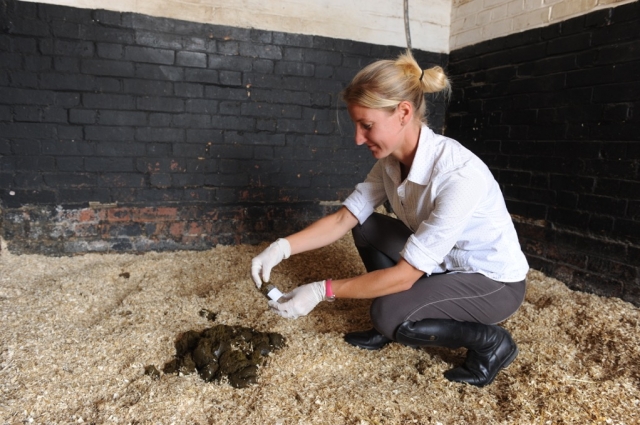
Count Eggs After Easter Says Zoetis
Count eggs after Easter says Zoetis
London, UK, 23 March 2016 – Worms become more active once the weather starts to warm up so after Easter is the time to start conducting regular faecal worm egg counts (FWECs) to check your horses’ worm burdens, says Wendy Talbot, Zoetis vet.
While most horse owners understand why worm control is important, surveys have consistently shown that the majority still need help with the detail.1,2 They rely on their vet or suitably qualified person (SQP) for the right advice and it’s the responsibility of vets and SQPs to prescribe the most efficient wormer whilst at the same time minimising the growing threat of resistance.
In the winter when the temperature is lower, worm eggs and larvae don’t develop in such great numbers, which means fewer adult worm stages to produce eggs.3 Consequently, even though larvae may be present in the horse, FWECs can be misleading. Also, many horses are less likely to pick up infective worm larvae through grazing because they spend less time in the field.
When the weather warms up, not only do horses start to spend more time grazing but the numbers of eggs and larvae on the pasture quickly increase which in turn leads to more egg laying adults in the horse. On this basis FWECs should be conducted from the start of spring every six to eight weeks until the end of October.
Regular FWECs will identify horses that need dosing for redworm and those that don’t. They can also help determine if some other types of parasite are present. This is particularly useful in foals and weanlings where ascarids can be a problem. Using regular FWECs saves worming horses unnecessarily which helps to prevent the build-up of resistance to wormers. It can also save costs.
When horses need worming you must select the appropriate wormer for the worms you are targeting and administer the correct amount according to the horse’s bodyweight. This will ensure the most effective treatment and will help to maintain the effectiveness of the wormers we use. Remember that poo picking regularly during the grazing season – ideally every day – and also rotating grazing if possible will help reduce the overall worm burden and thus the need for excessive use of wormers.
Wendy’s tips for year-round worm control in adult horses
· Strategic treatments for all horses: Encysted small redworm – November/December, using a single dose of moxidectin or a five-day course of fenbendazole.
· Targeted treatments: Every two-three months throughout the grazing season carry out faecal worm egg counts and then treat for redworm (strongyles) as required (your prescriber will advise whether a treatment is required based on the faecal egg count result).
· Once or twice per year: Administer a tapeworm treatment or consult your vet about conducting a separate tapeworm test using a blood or saliva sample.
· Foals and yearlings are more susceptible to the threat of worms and in general they will need dosing more frequently than their adult counterparts.
“In summary, every horse should always be assessed as an individual in terms of health, history, environment and weight,” says Wendy Talbot. “The most effective wormer should be used for the specific worms you are targeting, in response to the results of your horse’s FWEC or in response to strategic requirements at particular times of year.”
For further information about worming visit www.wormingyourhorse.info. Further information is available from: Zoetis UK Ltd, Walton Oaks, Dorking Road, Walton-on- the-Hill, Tadworth, Surrey KT20 7NS Customer Support: 0845 3008034, www.zoetis.co.uk.
Use medicines responsibly: www.noah.co.uk/ responsible/
References
1The National Equine Health Survey, conducted by the Blue Cross and supported by Zoetis, was completed by 4951 horse owners in May 2015, with records returned for 14,952 horses. The survey contained questions on general horse health, care and management and was validated by Professor Josh Slater of the Royal Veterinary College.
2The National Equine Health Survey, conducted by the Blue Cross and supported by Zoetis, was completed by 3,669 horse owners in May 2014. The survey contained 25 questions on general horse health, care and management and was validated by Professor Josh Slater of the Royal Veterinary College.
3AAEP, 2013
More from Zoetis
- 93% of horse owners would vaccinate for EHV if their vet recommended it
- Zoetis calls vets to help test groundbreaking equine health-related quality of life (HRQL) assessment tool
- Vets encouraged to engage with their farmers on the importance of orf vaccination
- Zoetis Hosts Free Webinar to Share Latest Knowledge of Lungworm
- Vets Urge Action as Dog Arthritis Misconceptions Persist

 10 years ago
10 years ago  1872 views
1872 views
